If over 80% of asylum seekers in Ireland are coming from the UK via Northern Ireland, it begs the question - from where, are they making that journey.
Some international protection applicants have told RTÉ News that they took a ferry from Liverpool over to Belfast, so I visited one of the biggest port cities on the Irish Sea to find out more.
Liverpool is a city built on immigration.
Indeed, hundreds of thousands of Irish built lives here, including the grandparents of Liam Thorpe, political editor with the Liverpool Echo.
While increasing numbers of asylum seekers and refugees pose a challenge for the City Council, people are cognisant of the "proud tradition" of welcoming newcomers, according to Mr Thorpe.
Mr Thorpe said: "That doesn't mean that there isn't an impact on services, on housing, on things like that.
"I think if you ask anyone at the City Council, they will say that the system at the moment is unfair.
"You've got a city like Liverpool taking a disproportionate amount of vulnerable people - having to house them, provide those other services - and it's not fair compared to say, the number that are housed in some of the shires down south which are far more affluent."
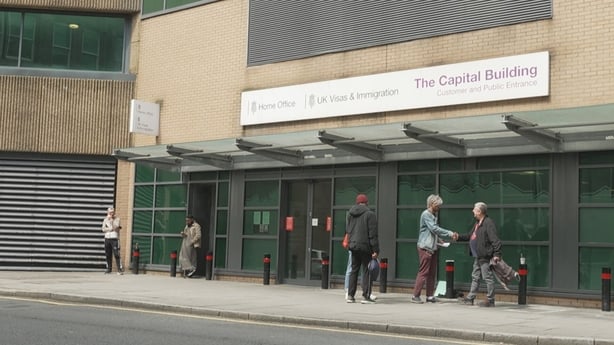
At the Home Office, which is responsible for UK Visas and Immigration - like the International Protection Office (IPO) in Dublin - Simon Petty waits outside.
He is a volunteer with Care4Calais, which is based in London, but expanded to the northwest, due to the increase in the number of people seeking asylum in that area.
Care4Calais seeks to offer support to pre-status asylum seekers - most often those who have arrived irregularly.
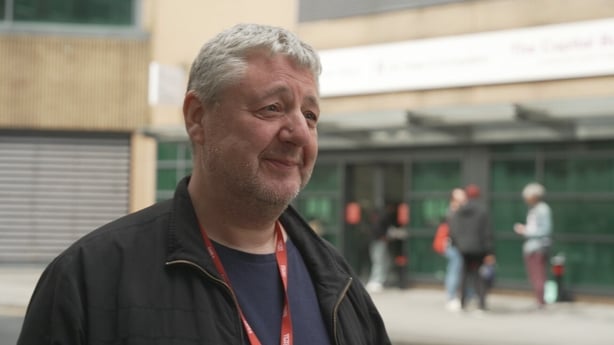
The problem is that the Rwanda Act has terrified women and men over the prospect of potential detention when they report to the Home Office building.
Mr Petty said: "We've been outside offering support and access to legal advice for the last four weeks.
"Only a few have been detained in the first week or two and less so now. But nonetheless the illegal Migration Act gives the Home Office the power to detain."
Turning to the situation in Ireland - everyone I speak to in Liverpool appears to be aware of the tents in Dublin - Mr Petty said he does not have anecdotal evidence about people "jumping" from the UK to Ireland.
He believes that Ireland’s membership of the EU is a pull factor.
We need your consent to load this rte-player contentWe use rte-player to manage extra content that can set cookies on your device and collect data about your activity. Please review their details and accept them to load the content.Manage Preferences
"Of course, Ireland is in Europe and therefore, has an unequivocal absolute reliance on the European Court of Human Rights and an asylum seeker would clearly look to having the umbrella protection of the European Court of Human Rights when assessing their asylum claim," he said.
From the city centre, I travelled to Merseyside where there is a support centre for refugees located in a church building.
It is a warren of corridors, with classrooms, meeting rooms and facilities to help refugees, located upstairs, and asylum seekers, located downstairs.
The powerhouse behind the Merseyside Refugee Support Network (MRSN) - now in its 22nd year - is Seána Roberts.
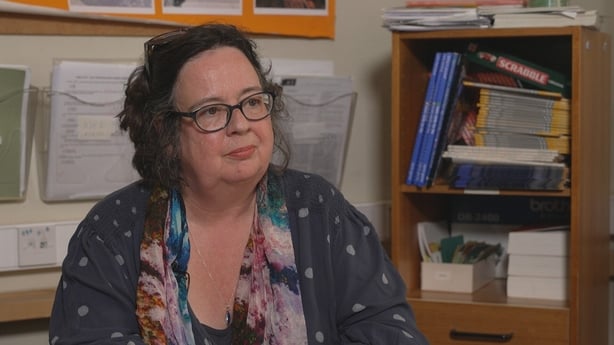
MRSN was a small charity that helped people in whatever way it could to enable refugees to integrate, get housing and work but last August, the situation changed dramatically.
In an unprecedented move, the Home Office started clearing its backlog of applications which meant people were suddenly given their refugee status and told to move from their accommodation.
It resulted in a rise in homelessness.
"It was having devastating effects. They were giving some people seven-day eviction notices, which isn't enough time to make a claim for benefit or find alternative accommodation," according to Ms Roberts.
"Previously, we had maybe two or three people made homeless in a year," she said.
"Suddenly, we had more than 20 people a day turning up going, 'I've got nowhere to go'," she added.
Liverpool is currently experiencing a housing crisis.
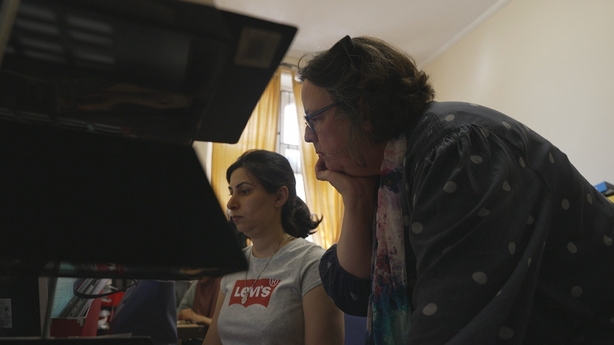
There are 14,000 people on the waiting list for social housing.
People in the City Council have acknowledged that "hundreds of people" have gone into the council building desperately looking for somewhere to live, but there is nothing available.
Tents in Liverpool are viewed as a last resort, so where did the refugees go last August?
Ms Roberts said some couch surfed, others went back to their asylum accommodation and slept on the floors, but inevitably people ended up sleeping rough in parks.
"We resisted it for a long, long time - the notion of handing out tents or sleeping bags," she said.
"But when there's no choice, you sort of go well, if you feel safer in a sleeping bag or in a tent, you can have one," she added.
Ms Roberts' colleague at the centre is case worker Al Hussein, who is originally from Sudan, but who came to the UK as an asylum seeker 15 years ago, received refugee status and is now a British citizen.
He was taught English by an Irish Christian Brother called Eamon Doyle, who worked at the centre for 20 years and passed away a number of years ago.
His intention is to visit Ireland.
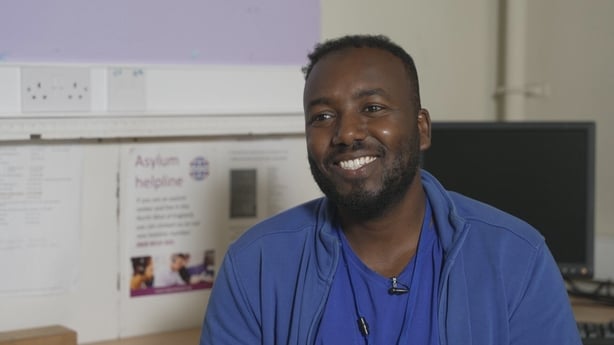
"When I came here in 2009, he was like my big brother or like my dad," Mr Hussein said.
"So, I have a lot of love for the Irish people and the Irish community as well," he added.
Asked if people talk about seeking asylum in Ireland, Mr Hussein said that they do talk about going to "other countries".
"The problem is especially with the Rwanda plan, people are scared ... they want to go to another country because of the immigration system here in the UK, people find it is not fair," he said.
Despite the strain on city services like housing and the wider cost of living crisis, Liam Thorpe said that in general, the issue of immigration has not created divisions in society.
He said: "People here are too canny for that.
"They don't get taken in by it. They point the finger of blame where they believe it should be pointed and that is the government.
"The government have created this crisis, the government have left a council like Liverpool in tatters."
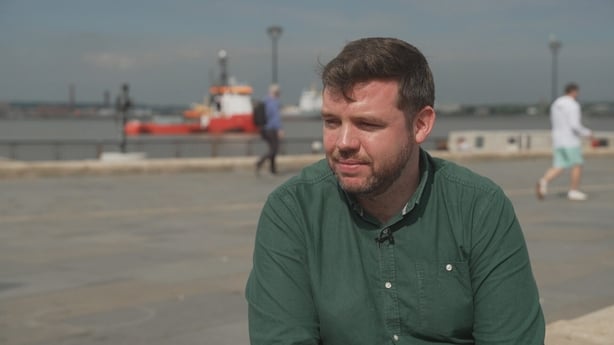
It is widely acknowledged that Liverpool benefited greatly from the EU. It was European Capital of Culture in 2008, which saw significant funds directed its way.
However, since 2010, £500 million has been cut away, according to Mr Thorpe, adding that this this has angered people.
He acknowledged that there have been "pockets" of tension; including outside the Suites Hotel in Knowsley last year, located about 30 minutes outside Liverpool, where asylum seekers were accommodated.
Mr Thorpe said that this "was an example of where, we believe, the far right got under the surface of the community and tried to point people in the direction of asylum seekers to stir up that anger".
"I would say on the whole, from my experience across Liverpool, people aren't taken in by that. They want to help people," he said.
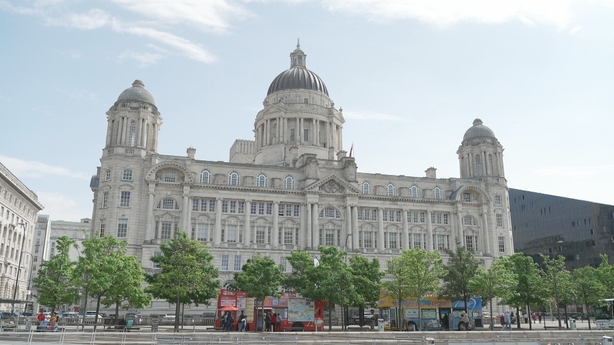
Despite spending most of her life in Liverpool, Ms Roberts is originally from Northern Ireland, which means her consideration of the question of asylum seekers travelling across the land border from Northern Ireland to the Republic of Ireland has plenty of perspective.
"Well, I suppose it's the irony of geography, isn't it, that Britain chose not to be part of Europe, but also has to fulfil its obligations with Ireland," she said.
"If, as a result of Brexit, Britain's hostile environment is actually impacting on another European country then I think Ireland is right to stand up for its position. Absolutely," Ms Roberts said.
At the same time, what's the solution? We don't want borders up again," she added.
The solution, it appears, is checks on the land border between Northern Ireland and the Republic of Ireland.
Choosing the route that an asylum seeker may take from Liverpool to Dublin, I took the ferry from Liverpool to Belfast.
Following an eight-hour overnight trip, I caught an early morning bus from Belfast city to Dublin, which was the most inexpensive means of travel at €11.50.
By this point, I had not been asked to show my passport since I left Dublin Airport 36 hours previously.
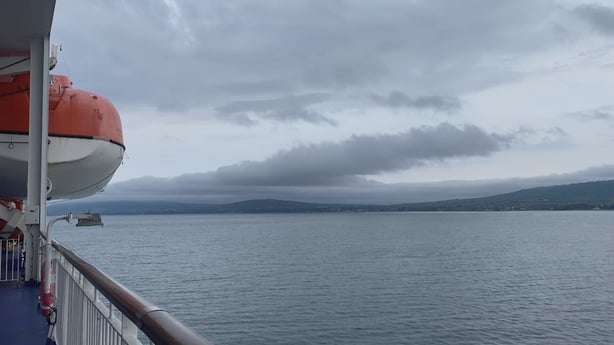
As the door of the bus closed, the driver warned us to have identification - including visas and passports ready - because immigration was "on the border and if you haven't ID, they'll take you off the bus".
After I crossed the border on the Newry to Dundalk Road, 40 minutes into the journey, the bus was stopped by members of the Garda National Immigration Bureau (GNIB), who boarded and checked identification.
Some passengers were asked how long they intended to stay in the Republic of Ireland.
Everyone remained on board and the GNIB team disembarked.
These immigration checks are conducted by gardaí under Operation Sonnet, which has been in existence for some time, but the number of checkpoints this year will surpass last year's total.
The objective of Operation Sonnet, according to Minister for Justice Helen McEntee, is to tackle abuse of the Common Travel Area with "a focus on the movement of people between Northern Ireland and the Republic of Ireland".
The overt element involves GNIB officers operating checkpoints and vehicle stops to conduct immigration checks on passengers travelling on public and private transport.
In a written reply to Aontú’s Peadar Toibín last week, the minister said that during the 21 day of action operations in 2023, up to 20 May this year, 107 people were detected entering the State without the requisite visas or identity documents.
She said those who sought to enter Ireland illegally were "refused leave to land and returned to the UK by ferry from Dublin Port to Holyhead".
The minister added that where it was confirmed that they were resident in Northern Ireland, they were returned to Belfast.
If authorities are correct in their estimation that most asylum seekers are crossing the land border, checkpoints of this kind could become the norm and not the exception.






